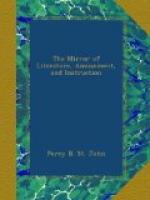Yet is there still much jovial heartiness in the festive revelry of the mountaineers. One scene, in which I was a participator, I will endeavour to portray—it is impressed on my memory by more than one token of grateful reminiscence. It was in the summer of 1825 that I left London for a few weeks, and sought among my native hills a reparation of the wear and tear of half-a-dozen years of hard and unceasing toil. Two days after my arrival In Merionethshire was celebrated the birthday of Robert Williams Vaughan, Esq., of Nannau, the only son of Sir Robert Williams Vaughan, Bart., and member for the county; a gentleman of whom it may be truly said, that his heart is replete with every noble and benevolent attribute, and that his mind is dignified by practical wisdom, sound sense, and energy to direct, for the benefit of his dependents, the fine and Christian virtues which he possesses. “Come up to Nannau,” is his encouraging address to the labourer, when the hardships of winter are pressing upon the poor: “Come up to Nannau, show me that you are willing to work, and I will give you your wages.” It is for benevolence like this, well and usefully exercised, that Sir Robert Vaughan is especially remarkable, as well also for all those qualities which adorn and dignify the British country gentleman. Always careful of the welfare, habits, and comforts of the poor around him; patronizing the industry, ingenuity, and good conduct of his more humble countrymen, and ministering to the wants of the sick and the poor; hospitable in the extreme; kind, affable, and friendly to all, he fulfils in every respect the happy duties of the wealthy British landholder; and by his generous courtesy he has ensured to himself the perfect esteem of every person who knows him. Living in the midst of a cheerful and contented tenantry, the chieftain as it were of a devoted clan, the proprietor of Nannau may be truly termed a happy man. The empty blandishments of the world have no charms for him, nor have its ephemeral pleasures any allurement; for, like the gallant knight of Peugwern, when invited by Henry the Seventh to share the honors of his court, for services rendered at Bosworth Field, he would meekly but promptly reply, “Sire! I love to dwell among mine own people.” Such is Sir Robert Vaughan of Nannau, whose memory will be long and fondly cherished by those who have enjoyed his friendship, and witnessed his calm, manly, and useful virtues.




